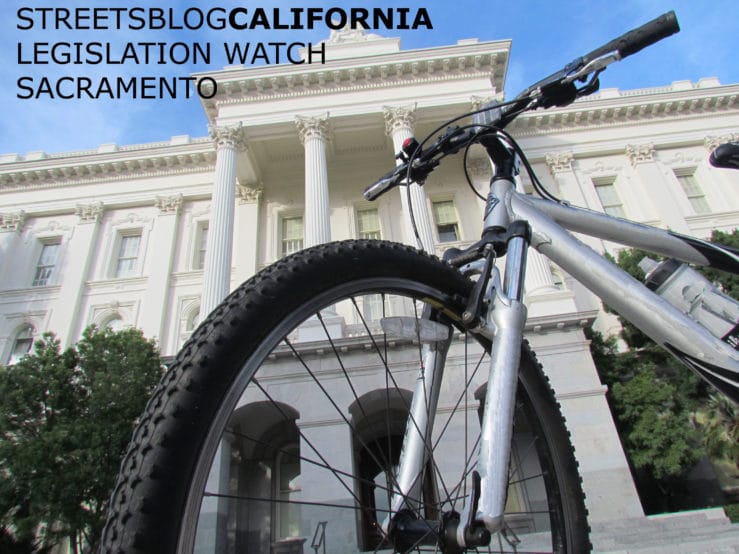This post was originally appeared on Streetsblog California.
 A new bill from Senator Scott Wiener (D-San Francisco), S.B. 760, would make the safety of all road users, not just drivers, a priority for the state’s department of transportation.
A new bill from Senator Scott Wiener (D-San Francisco), S.B. 760, would make the safety of all road users, not just drivers, a priority for the state’s department of transportation.
The bill is sponsored by a group of safety and health advocates, including the California Bicycle Coalition, the Safe Routes to School National Partnership, California Walks, and the American Heart Association.
“Although Caltrans has made some improvements in terms of its consciousness of the need to improve conditions for all users, it still has along way to go,” said Senator Wiener. “At times it is still focused on a mind set of streets existing solely to move through as many cars as possible.”
Caltrans already has a “Complete Streets Program,” which includes an “implementation action plan,” staff training courses, development of a statewide bike and pedestrian plan, and ongoing revision of state design manuals. It has set goals that include increasing the number of trips Californians make by bike and by foot. But the department too often makes moving vehicles a priority over safe and attractive infrastructure for people not sitting in a car.
“While we’ve seen progress in planning and goal-setting, that progress hasn’t been realized yet in better projects on the ground,” said Jeanie Ward-Waller, Policy Director for the California Bicycle Coalition and one of the bill’s sponsors. “S.B. 760 will push Caltrans to follow through in project implementation and to be a leader in designing safe streets,” she said.
The bill would make policy changes at Caltrans to ensure that when state highways in urban areas—which in many cases are also local streets and roads—are repaired, rebuilt, or redesigned, the safety of everyone who uses the street is considered, from design to completed project.
Senator Wiener says the bill is in part a result of his experience working with Caltrans on issues around the state highways and their connecting streets in San Francisco, both while he was on the San Francisco Board of Supervisors as well as in his previous job at the city attorney’s office.
“I totally support having streets that allow cars to get through,” said Wiener. “But these are also local streets, and they need to be designed for all users, not just cars. People use buses, they walk, they cross the street—and some of these state highways are not safe for them.”
The bill aims to do a number of things, and sets aside a portion of the Caltrans budget to ensure those things happen.
- It would establish a Division of Active Transportation within Caltrans to guide and facilitate progress towards meeting Caltrans active transportation goals.
- It would require Caltrans to include new pedestrian and bicycle facilities, or improve existing facilities, as part of any capital improvement project on a state highway or crossing a state highway.
- It would both prioritize funding for active transportation and make it easier to track and account for projects that are already improving conditions for people on bikes and on foot. It would require the California Transportation Commission, which makes transportation funding decisions, to give high priority to reducing fatalities and severe injuries for vulnerable road users—and to not increase vehicle miles traveled.
“I don’t claim that Caltrans is not doing anything—they really are,” he added. “They’ve made improvements in this area, but it’s just taking too long.”
Ward-Waller of CalBike says that Caltrans “has a long history of working to make California a better place to drive.”
“We’ve been pushing the department to make our state roads better for people biking and walking for years,” she said of CalBike’s and other groups’ policy efforts. “S.B. 760 will push Caltrans to follow through in project implementation and to be a leader in designing safe streets.”
The bill is also aiming for a deeper change in the way the state funds and builds its transportation systems, something that is not showing up in the transportation funding bills currently wending their way through the legislative process.
“All state agencies handling funding need to take strongly into account all users, not just cars,” said Senator Wiener. “That should always be a significant factor in construction and design decisions.”
